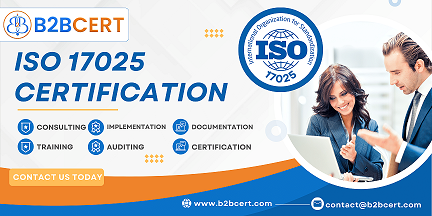
ISO 17025 is the international standard for testing and calibration laboratories, established by the International Organization for Standardization (ISO) and the International Electrotechnical Commission (IEC). This standard specifies the general requirements laboratories must meet to demonstrate their competence, impartiality, and consistent operation in producing valid test and calibration results.
ISO 17025 Certification in Bangalore is crucial for laboratories that provide testing or calibration services, as it helps ensure quality and technical reliability. It is widely recognized across industries such as pharmaceuticals, food and beverages, automotive, and environmental testing. Compliance with ISO 17025 enhances credibility and fosters trust among customers, regulatory bodies, and stakeholders.
Key Requirements of ISO 17025
The ISO 17025 standard consists of two main sections:
- Management Requirements: These pertain to the overall operation of the laboratory, including document control, risk management, and internal audits.
- Technical Requirements: These ensure the laboratory is competent in carrying out testing and calibration procedures, covering personnel competence, equipment calibration, method validation, and measurement traceability.
1. Management Requirements
Organizational Structure: Clearly define roles, responsibilities, and authority to streamline laboratory operations and decision-making. Establish a hierarchy to enhance accountability and workflow efficiency.
Document Control: Maintain updated quality manuals, SOPs, and records to ensure consistency and traceability. Implement a system for document approval, revision, and secure storage.
Risk Management: Identify and assess risks that could impact test quality and implement preventive measures. Regularly review and update risk mitigation strategies to maintain accuracy and reliability.
Internal Audits and Corrective Actions: Conduct periodic internal audits to detect deviations and ensure compliance with quality standards. Implement corrective and preventive actions to address non-conformities effectively.
Customer Communication: Establish clear channels for handling customer inquiries, requirements, and feedback. Proactively address concerns to enhance satisfaction and continuous service improvement.
2. Technical Requirements
Personnel Competence: Laboratory staff must undergo regular training to stay updated with testing and calibration procedures. Competence assessments should be conducted periodically to ensure adherence to quality standards.
Method Validation: Testing methods must be validated before use to confirm accuracy, reliability, and reproducibility. Regular reviews and updates should be performed to maintain compliance with industry standards.
Equipment Calibration: All instruments must be calibrated at scheduled intervals to ensure precision and reliability. Proper maintenance and documentation of calibration records are essential for quality assurance.
Measurement Traceability: Test results should be linked to recognized national or international standards for consistency. Traceability ensures credibility and comparability of measurements across laboratories.
Testing and Calibration Reports: Reports must be detailed, presenting data, uncertainties, and relevant observations clearly. Accuracy and transparency in reporting help maintain trust and compliance with regulatory requirements.
Benefits of ISO 17025 Certification
ISO 17025 services in Hyderabad provide numerous benefits, including:
- Global Recognition: Certification enhances the laboratory’s credibility and acceptance worldwide, facilitating international collaborations. It positions labs in Hyderabad as trusted testing and calibration centers.
- Improved Quality and Reliability: Ensures accurate and consistent testing and calibration results, minimizing errors. This boosts operational efficiency and customer satisfaction.
- Increased Customer Confidence: Demonstrates the laboratory’s commitment to high standards, boosting client trust. Clients are more likely to choose certified labs in Hyderabad.
- Regulatory Compliance: Helps laboratories meet regulatory and industry-specific requirements, avoiding legal issues. It ensures adherence to local and international standards.
- Competitive Advantage: Enhances marketability and business opportunities by showcasing laboratory competence. ISO 17025-certified labs in Hyderabad stand out in a competitive market.
Steps to Achieve ISO 17025 Certification
- Step 1: Understanding the Standard
Familiarize yourself with the requirements of ISO 17025 and how they apply to your laboratory’s operations.Ensure all team members understand the purpose and benefits of achieving this standard. - Step 2: Gap Analysis
Evaluate current processes to identify gaps between existing practices and ISO 17025 requirements .This helps prioritize necessary changes and improvements for compliance. - Step 3: Develop a Quality Management System (QMS)
Create and document procedures, policies, and records required by ISO 17025.
Ensure the QMS covers all aspects of laboratory operations, including testing and calibration. - Step 4: Staff Training and Awareness
Train staff on ISO 17025 requirements relevant to their roles and responsibilities.
Promote awareness of quality objectives and the importance of consistent compliance. - Step 5: Implement Required Changes
Address identified gaps by updating procedures, validating methods, and calibrating equipment. Ensure all changes are documented and integrated into the QMS. - Step 6: Internal Audit and Management Review
Conduct internal audits to assess compliance and identify areas for improvement.
Management reviews ensure continued suitability, adequacy, and effectiveness of the QMS. - Step 7: Choose an Accreditation Body
Select an accredited and recognized body to perform the certification audit.
Ensure the chosen body is relevant to your industry and scope of testing. - Step 8: Certification Audit
The accreditation body conducts a thorough evaluation of your laboratory’s compliance.
Address any non-conformities through corrective actions before final approval. - Step 9: Obtain Certification
Once all requirements are met, the accreditation body grants ISO 17025 certification.
Maintain compliance through continuous improvement and periodic audits.
How to get ISO 17025 Certification
To get ISO 17025 Consultants in Mumbai, laboratories need to implement a quality management system that meets the ISO 17025 standards for testing and calibration. The process involves preparing documentation, conducting internal audits, and ensuring technical competence. After implementing the system, the lab must approach an accredited certification body for an external audit. If the audit is successful, the certification is granted. It’s recommended to seek guidance from a consultancy specializing in ISO 17025 for a smoother process.





Leave a Reply